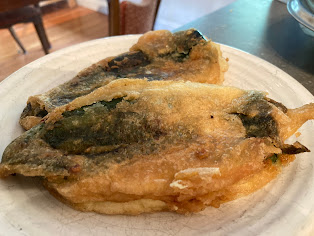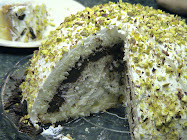 In January, 2005 my sister Frances died of multiple myeloma. The two years of her illness were often emotionally grueling for me; I watched her fight for her life with a rawness that can only come from dying, something almost too difficult to endure. Caring for her physically left me equally exhausted. But the relief that her death brought was only in exchange for losing her completely. My grief was slow, sullen and brooding. Then in November my brother Harold died unexpectedly. The gray winter of Toronto wore on as I wandered through my grief. Truth be told, I had no enthusiasm to sort out the pain of my losses. My pervasive loneliness only intensified as a sad dullness crept in for which I had no antidote.
In January, 2005 my sister Frances died of multiple myeloma. The two years of her illness were often emotionally grueling for me; I watched her fight for her life with a rawness that can only come from dying, something almost too difficult to endure. Caring for her physically left me equally exhausted. But the relief that her death brought was only in exchange for losing her completely. My grief was slow, sullen and brooding. Then in November my brother Harold died unexpectedly. The gray winter of Toronto wore on as I wandered through my grief. Truth be told, I had no enthusiasm to sort out the pain of my losses. My pervasive loneliness only intensified as a sad dullness crept in for which I had no antidote.That winter and spring as I remembered the anniversary of my sister's death and still couldn't comprehend my brother's, I found solace in an unlikely place, a palliative care hospice where once a week I prepared meals for its residents.
At the hospice Death was imminently present. Every Saturday morning as I stepped into the front door I saw another candle burning in memory of a resident who had died in the previous twenty four hours. Nor was my own grief absent; I was reminded of Frances and Harold on every visit. But to my surprise, my grief rarely overwhelmed me. When it was present with me in the kitchen, as it so often was, it became just one grief among the many that filled the house. I stood behind the kitchen cabinet and saw tenderness in the eyes of Stuart as he described the prayer he said at the death bed of his fellow resident. I sat at the table and recognized long lost nostalgia about logging in northern Ontario in Albert's voice as he ate the pancakes I had fried. I cut up an orange for Glenda as she described her chemo. I handed Violet a cup of milk as I listened with sadness to her rambling medication-induced fear of abandonment.
But grief is not gloom. In The House's bright, airy kitchen I cooked pots of soup, layered dishes of casseroles and tossed up salads. But not without frustration. Budgetary constraints ensured that the kitchen at the hospice was never well stocked so I had to be creative with what little there was. When I arrived on Saturday morning and opened the fridge to see what my options were for the day, I did so with some hesitation. I developed a little mantra that assisted me in opening the fridge with anticipation rather than dread: "will it be carrots, potatoes and onions, or will it be potatoes, carrots and onions? Oh joy, it's onions, carrots and potatoes." One Saturday I arrived to find a large cabbage in the fridge. Borscht was my first and only thought. But quickly my mind turned to all the ingredients that would not be available. Beets--I'd never yet seen beets at The House. Beef for stock--if I were lucky I'd find a cut of reduced-to-sell-freezer-burned meat. Fresh herbs--not likely. Green pepper--well, I could forgo that without compromising the borscht too much. I feebly pulled out my mantra--carrots sigh potatoes sigh onions--to rekindle my enthusiasm when Naomi stepped into the kitchen. She asked, as she usually did, "what you making?" To my pessimistic, "borscht, if I can find the ingredients," her whole body responded with anticipation, "I love borscht, Kerry." She immediately announced that she would buy sour cream for the borscht on her walk that morning. My enthusiasm now rekindled, I added parsley to her shopping list.
Now with the welcome obligation of having to please at least one person, I began scrounging through the cupboards, the freezer and the storage area for whatever I could find. The cupboard yielded a tin of tomatoes, I picked off every feather of dill from the herb pot on the deck, my forage through the freezer turned up a package of beef, freezer burned to be sure, and to my amazement I found beets in the storage room which another volunteer had donated from his garden.
As I was shredding the cabbage and cooking the beef, Roman arrived in the kitchen. Well enough to have an appetite, he frequently came to inspect what I was cooking for lunch. He wanted to know exactly how I was going to make the borscht. Ukrainian by birth, Roman had a decided opinion about borscht, as he had about most things, and he explained the variations between Polish, Hungarian--Hungarian borscht, I was told, is a thin broth of pureed vegetables--and Ukrainian borschts. Mennonite borscht, however, stumped him. When I described my borscht variation he responded by assuring me that it wouldn't be as good as his mother's. The upshot of our vigorous discussion was my concession that undoubtedly I would not be able to make borscht as good as his mother had but that I would make it every bit as good as my mother had made it.
Several residents felt well enough to eat lunch that day and some staff joined us as well. The table was full; six or seven people animated by a pot of soup. Naomi generously shared her sour cream; Roman continued on in his role of self-proclaimed borscht expert. Just a pot of borscht--onions, carrots and potatoes cooked up with a few other ingredients--but somehow, gently, it held my grief.















































2 comments:
eagerly awaited blog entry and I was not disappointed. thank you. julene
This piece moves me more than any other piece of writing I've read in a while, Kerry. There is of course the familiarity of the hospice setting- the awareness of which you deepen-- and richly played out is the intimate connection between food and life. I feel a kind of achy longing for all things combined with an acknowledgement of the small moments that hold everything.
Post a Comment